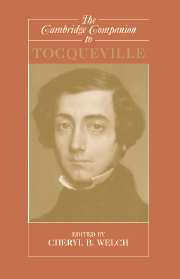Book contents
- Frontmatter
- Introduction: Tocqueville in the Twenty-First Century
- 1 Tocqueville’s Comparative Perspectives
- 2 Tocqueville on 1789: Preconditions, Precipitants, and Triggers
- 3 Tocqueville’s New Political Science
- 4 Tocqueville, Political Philosopher
- 5 Tocqueville’s Democracy in America Reconsidered
- 6 Translating Tocqueville: The Constraints of Classicism
- 7 The Writer Engagé: Tocqueville and Political Rhetoric
- 8 The Shifting Puzzles of Tocqueville’s The Old Regime and the Revolution
- 9 Tocqueville and Civil Society
- 10 Tocqueville on Threats to Liberty in Democracies
- 11 Tocqueville on Democratic Religious Experience
- 12 Tocqueville on Fraternity and Fratricide
- 13 Tocqueville and the French
- 14 Tocqueville and the Americans: Democracy in America as Read in Nineteenth-Century America
- Bibliography
- Index
- Series List
9 - Tocqueville and Civil Society
Published online by Cambridge University Press: 28 January 2007
- Frontmatter
- Introduction: Tocqueville in the Twenty-First Century
- 1 Tocqueville’s Comparative Perspectives
- 2 Tocqueville on 1789: Preconditions, Precipitants, and Triggers
- 3 Tocqueville’s New Political Science
- 4 Tocqueville, Political Philosopher
- 5 Tocqueville’s Democracy in America Reconsidered
- 6 Translating Tocqueville: The Constraints of Classicism
- 7 The Writer Engagé: Tocqueville and Political Rhetoric
- 8 The Shifting Puzzles of Tocqueville’s The Old Regime and the Revolution
- 9 Tocqueville and Civil Society
- 10 Tocqueville on Threats to Liberty in Democracies
- 11 Tocqueville on Democratic Religious Experience
- 12 Tocqueville on Fraternity and Fratricide
- 13 Tocqueville and the French
- 14 Tocqueville and the Americans: Democracy in America as Read in Nineteenth-Century America
- Bibliography
- Index
- Series List
Summary
INTRODUCTION: THE REBIRTH OF CIVIL SOCIETY
Tocqueville's reflections on civil society have proven to be one of his most enduring theoretical legacies. They have also proven to be one of the most contested and promiscuously appropriated. This is especially so in America, where in recent years there has been an explosion of academic and journalistic writing on the topic of civil society. Authors from across the ideological spectrum have turned to Tocqueville for guidance in figuring out how the resources of civil society - the diverse array of political, charitable, educational, religious, neighborhood, and professional associations - might best be deployed in the fight against a wide range of social ills. These include perceived declines in civic engagement and individual responsibility, the loss of trust and a sense of community, and the spread of urban decay, apathy, and selfishness.
Perusing this literature, the casual reader might well conclude that ''civil society'' has become little more than a feel-good slogan in a time of generalized distrust of (or impatience with) governmental institutions. The core of Tocqueville's idea - civil society as the sphere of intermediary organizations standing between the individual and the state - has been worked and reworked to the point where it is no longer clear where the primary importance of this realm lies.
- Type
- Chapter
- Information
- The Cambridge Companion to Tocqueville , pp. 216 - 244Publisher: Cambridge University PressPrint publication year: 2006
- 12
- Cited by



